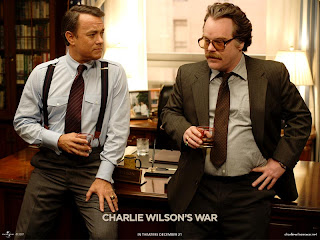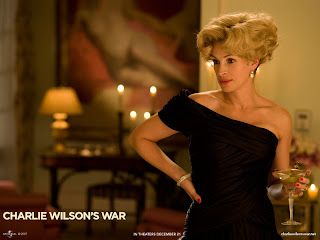Lake Superior State University has recently published its 33rd annual
List of Words Banished From the Queen's English for "misuse, overuse, or general uselessness."
The winners / losers are:
PERFECT STORM – for overuse. The pundits on TV show say "perfect storm" when they mean just about any coincidence. I agree with this one. Stop using book titles in a way that indicates that you haven't even read the book.
WEBINAR – a made-up word. A seminar on the web about any number of topics.
I'd have to disagree with this one. I haven't heard it used that much. Yet. I think there are a number of more deserving candidates.
WATERBOARDING – "Let's banish 'waterboarding' to the beach, where it belongs with boogie boards and surfboards." – Patrick K. Egan, Sault Ste. Marie, Michigan. I have mixed emotions on this one. It was probably used most during 2007 by Jon Stewart of The Daily Show, and I love my Daily Show.
ORGANIC – Overused and misused to describe not only food, but computer products or human behavior, and often used when describing something as "natural," says Crystal Giordano of Brooklyn, New York. I'd like to add the word "green" to the list as well, for the same reasons.
WORDSMITH / WORDSMITHING – "I've never read anything created by a wordsmith - or via wordsmithing - that was pleasant to read." – Emily Kissane, St. Paul, Minnesota. What the heck is wrong with "editor"?
AUTHOR / AUTHORED – "In one of former TV commentator Edwin Newman's books, he wonders if it would be correct to say that someone 'paintered' a picture?" – Dorothy Betzweiser, Cincinnati, Ohio. What the heck is wrong with "writer"?
POST 9/11 – "'Our post-9/11 world,' is used now, and probably used more, than AD, BC, or Y2K, time references. You'd think the United States didn't have jet fighters, nuclear bombs, and secret agents, let alone electricity, 'pre-9/11.'" – Chazz Miner, Midland, Michigan. Agreed. So overused.
SURGE – "'Surge' has become a reference to a military build-up. Give me the old days, when it referenced storms and electrical power." – Michael F. Raczko, Swanton, Ohio. I disagree with this; it's an important part of the news. I suppose they could say "military build-up" but in our 10-second news bite culture, that takes too long to say.
GIVE BACK – "Various media have been featuring a large number of people who 'just want to give back.' Give back to whom? For what?" – Curtis Cooper, Hazel Park, Michigan. I have a problem with this one, too. What is wrong with people wanting to do community service? This entry confuses me.
'BLANK' is the new 'BLANK' or 'X' is the new 'Y' – "Believed to have come into use in the 1960s, but it is getting tired. The comparisons have become absurd." – Geoff Steinhart, Sault Ste. Marie, Michigan. This ridiculous phrase was spoofed in the musical Wicked when a character scoffs "Black is the new pink."
BLACK FRIDAY – "The day after Thanksgiving that retailers use to keep themselves out of the 'red' for the year. (And then followed by "Cyber-Monday.") This is counter to the start of the Great Depression's use of the term 'Black Tuesday,' which signaled the crash of the stock market that sent the economy into a tailspin. – Carl Marschner, Melvindale, Michigan. I agree, so overused.
BACK IN THE DAY – "Back in the day, we used 'back-in-the-day' to mean something really historical. Now you hear ridiculous statements such as 'Back in the day, people used Blackberries without Blue Tooth.'" – Liz Jameson, Tallahassee, Florida. This phrase is so old that it was overused back in the day.
RANDOM – "Overuse on a massive scale by my fellow youth. Every event, activity and person can be 'sooo random' as of late. Banish it before I go vigilante." – Ben Martin, Adelaide, South Australia. This phrase has been overused for at least 10 years. Why banish it now?
SWEET – "Too many sweets will make you sick. It became popular with the advent of the television show 'South Park.'It is annoying when young children use it and have no idea why, but it really sounds stupid coming from the mouths of adults." – Wayne Braver, Manistique, Michigan Yikes. I'm guilty of this one myself.
DECIMATE – "'Decimate' has been turned upside down. It means 'to destroy one tenth,' but people are using it to mean 'to destroy nine tenths.' – David Welch, Venice, Florida. Thank you! This has been a pet peeve of mine for years! This has got to be one of the most misused words in the English language.
EMOTIONAL – "Reporters, short on vocabulary, often describe a scene as 'emotional.' Well sure, but which emotion? For a radio reporter to gravely announce, 'There was an emotional send off to Joe Blow' tells me nothing, other than the reporter perceived that the participants acted in an emotional way. For instance: I had an emotional day today. I started out feeling tired and a bit grumpy until I had my coffee. I was distraught over a cat killing a bird on the other side of the street. I was bemused by my reaction to the way nature works. I was intrigued this evening to add a word or two to your suggestions. I was happy to see the words that others had posted. Gosh, this has been an emotional day for me." – Brendan Kennedy, Quesnel, British Columbia, Canada. Wow, Brendan is certainly emotional.
POP – "On every single one of the 45,000 decorating shows on cable TV (of which I watch many) there is at LEAST one obligatory use of a phrase such as ... 'the addition of the red really makes it POP.' You know when it's coming ... you mouth it along with the decorator. There must be some other way of describing the addition of an interesting detail." – Barbara, Arlington, Texas. Don't forget, "And this will be a wonderful place to sit and read a book."
IT IS WHAT IT IS – "This pointless phrase, uttered initially by athletes on the losing side of a contest, is making its way into general use. It accomplishes the dual feat of adding nothing to the conversation while also being phonetically and thematically redundant." – Jeffrey Skrenes, St. Paul, Minnesota. One of the worst time wasters ever.
UNDER THE BUS – "For overuse. I frequently hear this in the cliché-filled sports world, where it's used to describe misplaced blame – i.e. 'After Sunday's loss, the fans threw T.O. under the bus." – Mark R. Hinkston, Racine, Wisconsin. Oops. I guess I'd better stop saying this one ...
What words or phrases do you think should be banned for misuse, overuse, or general uselessness?

